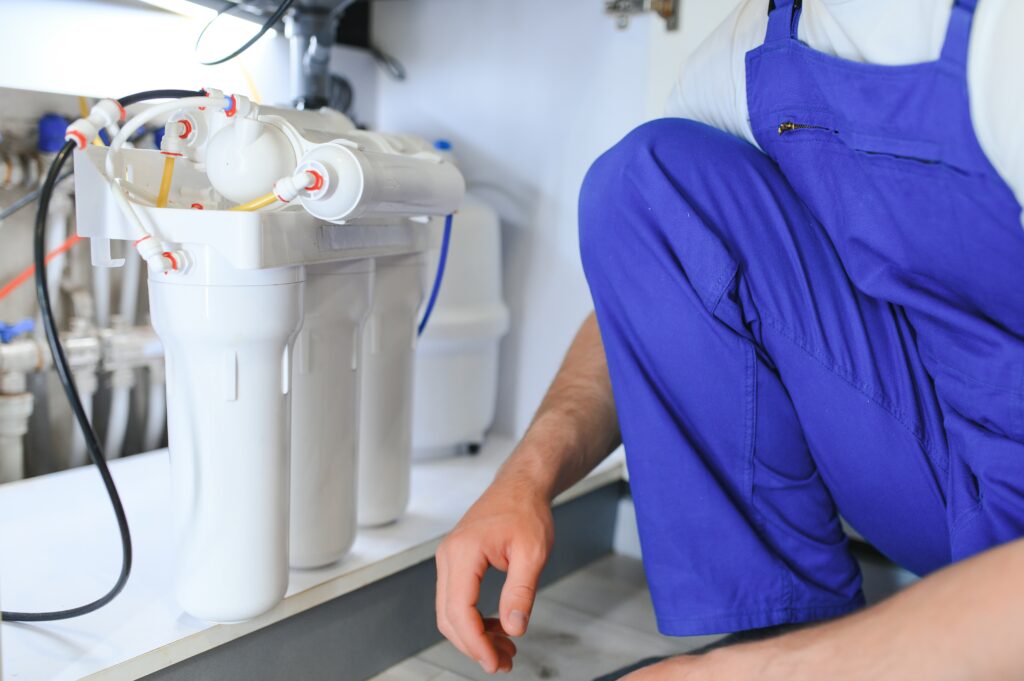Hard water, characterized by a high mineral content—mainly calcium and magnesium—can create numerous problems for both residential and commercial properties. It leads to issues such as scale buildup, inefficient appliance performance, and even dry skin and hair. To combat hard water, installing a water softener is often the most effective and efficient solution.
Water softener installation offers many advantages for residential and commercial properties, ranging from improved water quality to energy efficiency and cost savings. Our professionals have the skills and expertise to carefully assess your property’s specific needs, identify the most suitable water softener system for you, and seamlessly install it to provide you with lasting benefits. Read on as we outline the benefits of water softener installation and how our professionals can help improve the water quality of your residential or commercial property.
Choosing the Right Water Softener for Your Property
To maximize the benefits of a water softener installation, it’s essential to choose a system that best suits your property’s water usage and hardness level. There are various types of water softeners available, including salt-based ion exchange, salt-free, and magnetic or electronic water conditioners. Each system has its unique features and mechanisms for removing or neutralizing hard minerals in water. Our professionals can help you determine the best water softener for your residential or commercial property based on your specific needs and preferences.
Salt-based ion exchange softeners are the most common and effective method for reducing water hardness. These systems work by utilizing a process called ion exchange, replacing calcium and magnesium ions with sodium ions. Salt-free softeners, on the other hand, do not remove hard minerals from the water but instead condition them to reduce their build-up on surfaces. Magnetic and electronic water conditioners use magnetic fields or electronic impulses to alter the structure of the hard minerals with varying effectiveness.
Installation and Maintenance: Ensuring Peak Performance of Your Water Softener
Proper installation and maintenance are essential for maximizing the benefits and efficiency of your water softener. Our skilled technicians will ensure that your chosen system is installed correctly and in compliance with any local plumbing codes or regulations. Professional installation helps avoid potential issues such as leaks, system malfunctions, or even damage to your property.
Regular maintenance is also crucial in ensuring your water softener continues to function optimally. Our professionals can help you establish a maintenance schedule tailored to your specific system, which may include tasks such as checking salt levels, cleaning the brine tank, and inspecting system components. By keeping your water softener properly maintained, you can enjoy the sustained benefits of softened water in your property.
Water Softeners and the Environment: Balancing Benefits and Impact
While water softeners offer numerous benefits to residential and commercial properties, it’s essential to consider their environmental impact. Salt-based ion exchange softeners, for example, generate a brine discharge during the regeneration process that can contribute to increased salt levels in wastewater. This discharge can be a concern for some local environments and water treatment facilities.
To minimize the ecological impact of your water softener, you can opt for more eco-friendly options such as salt-free or magnetic conditioners or choose systems with efficiency certifications. Additionally, you should properly maintain your water softener to ensure optimal performance, as well-maintained systems consume less water and produce less waste. Our professionals can guide you in selecting an environmentally friendly system and provide maintenance services to ensure its efficiency.
Frequently Asked Questions about Water Softeners
To help expand your understanding of water softeners, here are some frequently asked questions and their answers:
1. How Do I Know If I Have Hard Water?
You can check for visible signs such as water spots on glassware, soap scum in sinks and showers, or scale buildup on fixtures. Alternatively, you can invest in a water hardness test kit or reach out to our professionals to test your water’s hardness level.
2. Does Softening Water Remove Minerals that Are Beneficial to Health?
Water softeners primarily remove calcium and magnesium ions, which are not essential to health when consumed in drinking water. Potassium, sodium, and other trace minerals remain in the softened water.
3. Is Softened Water Safe for Drinking?
Softened water is generally safe for consumption; however, some individuals may prefer the taste of hard water or be sensitive to the increased sodium levels. If you have concerns about drinking softened water, our professionals can recommend alternative solutions, such as installing a separate tap for unsoftened water or using a reverse osmosis system in conjunction with the softener.
Enhance Your Property's Water Quality with Professional Water Softener Installation
Installing a water softener in your residential or commercial property offers various benefits, from improved water quality and increased appliance efficiency to cost savings and environmental advantages. At Advance HAWS, our experienced professionals can guide you through the process of selecting the appropriate water softener for your property, ensuring a seamless installation, and providing necessary maintenance solutions. Don’t let hard water issues diminish the enjoyment and functionality of your property. Contact us today to discuss the best water softener and HVAC services in Lancaster that meet your unique needs.



